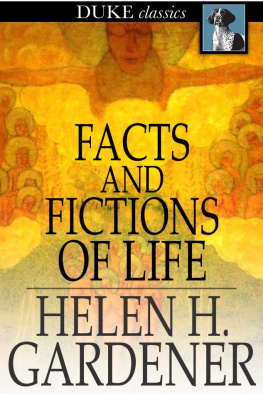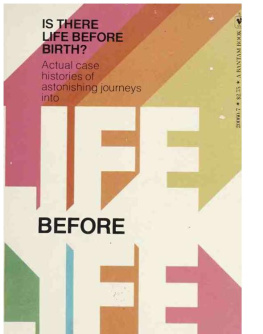Helen H. Gardener - Facts and Fictions of Life
Here you can read online Helen H. Gardener - Facts and Fictions of Life full text of the book (entire story) in english for free. Download pdf and epub, get meaning, cover and reviews about this ebook. year: 2013, publisher: Duke Classics, genre: Art. Description of the work, (preface) as well as reviews are available. Best literature library LitArk.com created for fans of good reading and offers a wide selection of genres:
Romance novel
Science fiction
Adventure
Detective
Science
History
Home and family
Prose
Art
Politics
Computer
Non-fiction
Religion
Business
Children
Humor
Choose a favorite category and find really read worthwhile books. Enjoy immersion in the world of imagination, feel the emotions of the characters or learn something new for yourself, make an fascinating discovery.
- Book:Facts and Fictions of Life
- Author:
- Publisher:Duke Classics
- Genre:
- Year:2013
- Rating:5 / 5
- Favourites:Add to favourites
- Your mark:
- 100
- 1
- 2
- 3
- 4
- 5
Facts and Fictions of Life: summary, description and annotation
We offer to read an annotation, description, summary or preface (depends on what the author of the book "Facts and Fictions of Life" wrote himself). If you haven't found the necessary information about the book — write in the comments, we will try to find it.
Intellectual and essayist Alice Chenoweth, who wrote under the pen name Helen H. Gardener, was one of the foremost thinkers of the late nineteenth century. She contributed groundbreaking ideas to the debates about controversial issues such as gender relations, womens suffrage, religion, and rationality. This collection brings together some of her most compelling analyses of social issues of the era.
Facts and Fictions of Life — read online for free the complete book (whole text) full work
Below is the text of the book, divided by pages. System saving the place of the last page read, allows you to conveniently read the book "Facts and Fictions of Life" online for free, without having to search again every time where you left off. Put a bookmark, and you can go to the page where you finished reading at any time.
Font size:
Interval:
Bookmark:

From an 1895 edition
ISBN 978-1-62013-307-1
Duke Classics
2013 Duke Classics and its licensors. All rights reserved.
While every effort has been used to ensure the accuracy and reliability of the information contained in this edition, Duke Classics does not assume liability or responsibility for any errors or omissions in this book. Duke Classics does not accept responsibility for loss suffered as a result of reliance upon the accuracy or currency of information contained in this book.
"But something may be done, that we will not:
And sometimes we are devils to ourselves,
When we will tempt the frailty of our powers,
Presuming on their changeful potency."
Shakespeare.
There are at least two sides to every question. Usually there areseveral times two sides; or at least there are several phases in whichthe question has a different aspect.
I am led to state these seemingly unnecessary truisms because I havebeen confronted by hearers or readers who assumed, since I had presenteda certain phase or manifestation of heredity in a given articleor lecture, that I was intending to argue that a fixed rule oftransmission would necessarily follow the line I had then and theredrawn.
Nothing could be farther from my idea of the workings of the law ofheredity.
Nothing could be more absurdly inadequate to the solution andcomprehension of a great basic principle.
Again; an auditor or critic remarks that "We must not forget that we,also, get our heredity from God;" which is much as if one were to say,in teaching the multiplication table, "Remember that three times threeis nine except, only, the times when God makes it fifteen." So absolutea misconception of the very meaning of the word heredity could hardly beillustrated in any other way as in the idea of "getting it from God."
Scientific terms and facts of this nature cannot be confounded withmetaphysical and religious speculation without hopeless confusion asto ideas, and absolute worthlessness as to the results of theinvestigation.
The very foundation principle of Evolution, itself, depends upon thepersistence of the laws of hereditary traits, habits and conditions,modified and diversified by environment and by the introduction of otherhereditary strains from other lines of ancestry.
Of course, there are people who do not believe that Evolution evolveswith any greater degree of regularity and persistence than is consistentwith the idea of a Deity who is liable to change his plans to meet theprayers or plaints of aspiration or repentance of those who chance tobeg or demand of him certain immunities from the workings of the laws ofnature. But with this type of mentalitywith this grade of intellectualgraspit were fruitless to pause to argue. They must be left to aneducation and an evolution of a less emotional and imaginative castbefore they will be able to take part intelligently in a scientificdiscussion even where the merest alphabet of the science is touched, asis the case in these essays. They must learn a method of thought whichkeeps inside of what is, or can be, known and demonstrated, and ceaseto vitiate the very basic premises by injecting into them what is merelyhoped or prayed for. The two phases of thought are quite distinct andtotally dissimilar in method.
The essays here collected, which do not deal directly with heredityand its possibilities, have been included in the book because of therepeated calls for them upon the different magazines in which theyappeared and because they are rightly classed among the facts andfictions of life with which we wish here to deal.
That most of them touch chiefly the dark side of the topics discussedis due to the fact that they were one and all written for a purpose inwhich that method of handling seemed most effective. That there is abrighter side goes without saying; but when a physician is writing alecture upon cholera or consumption he does not devote his time andspace to pointing out the indubitable fact that many of us have not, andare not likely to contract, either one.
In pointing out and commenting upon certain social and hereditaryconditions and evils, which it is desirable to correct or to guardagainst, and which it is all-important we shall first recognize asexisting and as in need of improvement, I have, it is true, dweltchiefly upon the evil possibilities contained in these conditions. I amnot, therefore, a pessimist. I do not fail to recognize the fact thatboth men and conditions are undoubtedly evolving into better and higherstates than of old. If one may so express it, these essays are theexpressions of a pessimistic optimist,one who is pessimistic uponcertain phases of the present for the present, and optimistic as to andfor the future. Let me illustrate: The housewife who does not have thehouse cleaned because it stirs up a dust to do it, is in the positionof those critics who insist that it is all wrong to call attention toabuses because abuses are not pleasant things to have held up to publicgaze. Or like a physician who would say: "For heaven's sake don't removethat bandage from the broken skull to dress the wound or you will seesomething even uglier than this soiled and ill-arranged cloth. Trust toluck. Some people have recovered from even worse conditions than thiswithout intelligent care and treatment. Let him do it."
I have often been asked how and why I ever chanced to think or to writeupon these topics. "How can a woman in your station and of your typeknow about them?" It is always difficult to say just how or why one minddoes and another does not grasp any given thing.
When I was a very young girl I heard a famous Judge read and discussa series of papers which were then appearing in the Popular ScienceMonthly, and which were called "The Relations Of Women To Crime." I wasthe only person admitted to the Club, where the consideration of thepapers took place, who was not mature in years and connected with one ofthe learned professions. I was admitted because I begged the privilegeas the guest of the family of the Judge at whose house the Club met.More than any other one thing, perhaps, the thoughts and suggestionsthat came to mea silent and unnoticed childwhile listening to thediscussions of those papers which hinted at the various possibilities ofinherited criminal tendencieshearing the lawyers comment upon it fromthe point of view furnished by their court-room experiences, and themedical men from their side of the topic, as practitioners upon thosewho had inherited mental or physical diseases, and the educators fromtheir outlook and experience with children and youths who had not yetbegun an open criminal course but who showed in their tendenciesthe need of intelligent training to modify or correct their faultyinheritance,more than any other one thing, perhaps, this experienceof my childhood led me into the study of anthropology and heredity. Thatother people have been interested in what I have written from timeto time upon this subject, and that I was, for this reason, askedto present certain phases of it at the recent World's Congress ofRepresentative Women, accounts for the publication of this book at thistime. I presume it will be said that it is not "pleasant reading for thesummer season." It is not intended for that purpose. It has beenasked for by many teachers, college professors, students and medicalpractitioners, the latter of whom have shown extraordinary interest inits early issue and wide circulation, and for whose kind encouragementand aid I am glad to offer here renewed thanks.
Font size:
Interval:
Bookmark:
Similar books «Facts and Fictions of Life»
Look at similar books to Facts and Fictions of Life. We have selected literature similar in name and meaning in the hope of providing readers with more options to find new, interesting, not yet read works.
Discussion, reviews of the book Facts and Fictions of Life and just readers' own opinions. Leave your comments, write what you think about the work, its meaning or the main characters. Specify what exactly you liked and what you didn't like, and why you think so.







